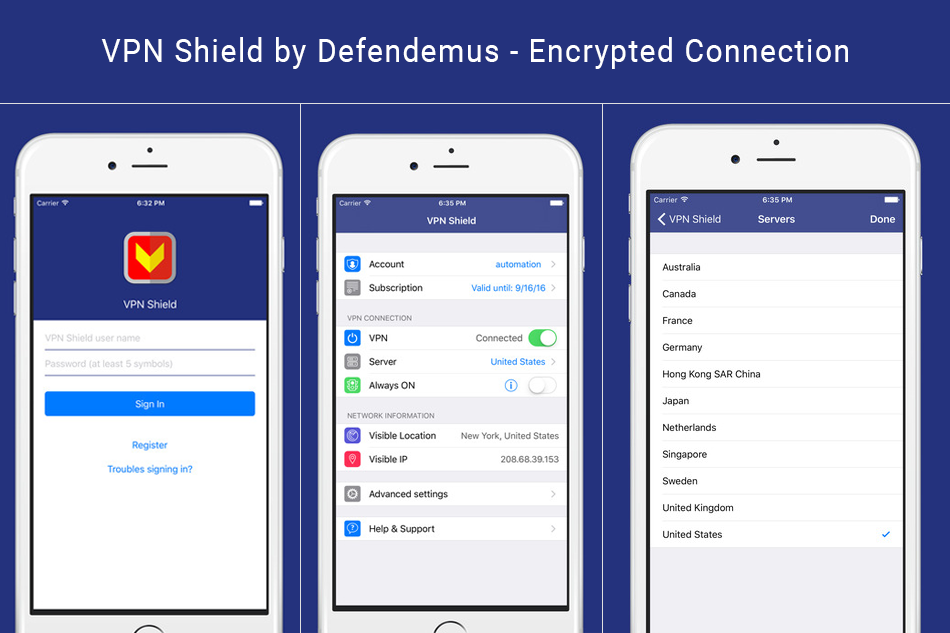

We strongly recommend against VPN services that use their own proprietary closed-source encryption protocol and do not let you switch to using OpenVPN. Some prefer to use their own, proprietary encryption protocols. Here are a few VPN services you may have heard of, that use OpenVPN as their default encryption protocol:īut not all providers do. Compatible Strong desktop support, works on all mobile OS.Fast Though not the fastest, speed decrease is only slightly noticeable.Very stable Connection drops are few and far between.With half a dozen other protocols available, that’s a strong sign. More than 90% of VPN providers default to OpenVPN. Most of us don’t have servers in 100 countries, hence we pay a VPN provider the right to use theirs. You still need access to whatever device or server you’re trying to connect to. It’s important to remember that OpenVPN is not a standalone VPN provider, it’s only a protocol.
#Open vpn shield exchange software
Putting it all together, OpenVPN is the software that transmits your data over either UDP or TCP, while encrypting it via 256-bit encryption OpenSSL library code & using an SSL/TSL key exchange. use static, pre-shared keys or TLS-based dynamic key exchange.use any cipher, key size, or HMAC digest (for datagram integrity checking) supported by the OpenSSL library.use all of the encryption, authentication, and certification features of the OpenSSL library to protect your private network traffic as it transits the internet.tunnel any IP subnetwork or virtual ethernet adapter over a single UDP or TCP port.In other words, here’s what OpenVPN can provide: This protocol can’t read or modify your data, it’s only there to lock it and exchange the keys between your device and VPN server.

Only the devices with the two keys are able to unlock the 256-bit encrypted data. Keys are what, figuratively, lock your data away from 3rd parties and spying eyes. OpenVPN then uses the SSL/TLS handshake protocol for key exchange. If UDP fails, OpenVPN automatically switches to TCP in order to reestablish a secure connection. Most VPN providers chose to setup OpenVPN via UDP by default. UDP, a “fire and forget” protocol is much faster, at the cost of reliability (no confirmation checks performed). Each time bits of data is transmitted via TCP, the sender awaits confirmation from the receiver before sending the next ones. As a computer orientated protocol, TCP performs checks to verify the transmission of data. It is used to guarantee all the data transmitted is received properly. TCP is one of the internet’s most commonly used protocols. OpenVPN uses one of two protocols to do so: TCP and UDP. It facilitates a secure transmission of your valuable data via a 256-bit OpenSSL encryption. If VPNs are a network of hidden tunnels, then OpenVPN is the tunnel itself! It creates the tunnel between the VPN software and VPN server.įirst developed by James Yonan back in 2002, OpenVPN is a VPN tunneling encryption protocol.
#Open vpn shield exchange install
The quick install & app setup + compatibility with Windows, Mac, iOS, Android and even Linux means that you too can easily take advantage of OpenVPN.Īre you sick of unreliable, slow free VPNs? Tired of seemingly half the world looking over your shoulder? Whether you’re trying to compare OpenVPN with IPsec or PPTP or just want to setup your VPN service with the best protocol to unblock geo-restricted content, we have your back. We also give you a glimpse at some up and coming rival VPN protocols, set to dethrone OpenVPN!

What is it, who uses it (who doesn’t) and why. In this 6 minute article we de-jargonize and explain everything you need to know about OpenVPN. OpenVPN is a fast, secure open-source SSL virtual private network encryption protocol.


 0 kommentar(er)
0 kommentar(er)
